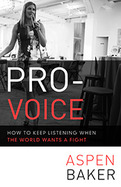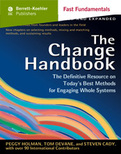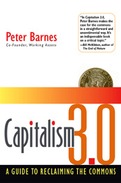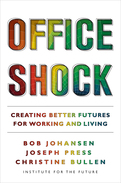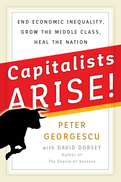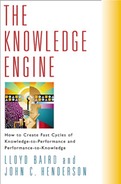2015
When Aspen Baker had an abortion at the age of twenty-four, she felt caught between the warring pro-life and pro-choice factions, with no safe space to share her feelings.
In this hopeful and moving book, Baker describes how she and Exhale, the organization she cofounded, developed their “pro-voice” philosophy and the creative approaches they employed to help women and men have respectful, compassionate exchanges about even this most controversial of topics. She shows how pro-voice can be adopted by anyone interested in replacing ideological gridlock with empathetic conversation. Peace, in this perspective, isn't a world without conflict but one where conflict can be engaged in—fiercely and directly—without dehumanizing ourselves or our opponents.
2006
Barnes shows how capitalism — like a computer — is run by an operating system. Our current operating system gives too much power to profit-maximizing corporations that devour the commons and distribute most of their profits to a sliver of the population. And government — which in theory should defend the commons — is all too often a tool of those very corporations.
Barnes proposes a revised operating system — Capitalism 3.0 — that protects the commons while preserving the many strengths of capitalism as we know it. His major innovation is the commons trust, a market based legal entity with the power to limit the use of scare commons, charge rent, and pay dividends — in both cash and services — to everyone.
In Barnes' vision, an array of commons trusts would institutionalize our obligations to future generations, fellow citizens, and nature. Once established, they'd use markets and property rights to create a better world for us all.
Capitalism 3.0 offers a practical alternative to our current flawed economic system. It points the way to a future in which we can retain capitalism's virtues while mitigating its vices.
- Watch a video of Peter Barnes on ForaTV
- By a cofounder and former president of Working Assets
- Offers a startlingly original way to adapt capitalism to the 21st century
- Shows that protecting "the commons"--humanity's shared natural and cultural heritage--is the key to revitalizing capitalism and safeguarding the planet
2023
“Office shock” is an abrupt, unsettling change in where, when, how, and even why we work. In this visionary book, three prominent futurists argue that the office is both a place and a process—offices and officing—with a new range of choices, including what they call the emerging officeverse. To see the possibilities with fresh eyes, we must use future-back thinking to ask, What is the purpose of your officing? What are the outcomes—especially regarding climate—you want to achieve? With whom do you want to office? How will you augment your intelligence? Where and when will you office? How will you create an agile office? Traditional offices were often unfair, uncomfortable, uncreative, and unproductive. This book explores how to seize this great opportunity to transform office work.
2017
Marshaling deeply sobering statistics, Georgescu depicts the stark reality of America today: a nation with greater wealth inequality and lower social mobility than just about any other country in the developed world. But the problem isn't that free-market capitalism no longer works—it's that it's been hijacked by shareholder primacy. Where once our business leaders looked to the needs and interests of a variety of stakeholders—employees, community members, the business itself—now they're myopically focused on maximizing their shareholders' quarterly returns.
Capitalists, Arise! shows how the short-term thinking spawned by shareholder primacy lies at the root of our current economic malaise and social breakdown. But Georgescu offers concrete actions that capitalists themselves can take to create a better future. The irony is that if businesses do this, shareholders will do even better. In the long run, businesses can thrive only when society is healthy and strong. This book is a manifesto calling on capitalists to heal the nation that has given them so much.
2001
The new economy moves with lightning speed. Those who would lead no longer have the luxury of analyzing, planning, then implementing. They must plan and implement simultaneously. Learning and performance must be integrated into a continuous cycle: knowledge must be captured from performance as it is happening and used to improve the next round of performance.
In their new book, Lloyd Baird and John Henderson show how to produce knowledge as part of the work process and quickly apply that learning back to performance to create a "knowledge engine" that drives ongoing performance improvement and adds value in every area of the organization. Built on five years of research and application in leading corporations, The Knowledge Engine details a five-step knowledge-performance cycle, explaining how to:
- Focus on exactly what is necessary to drive performance and create competitive advantage
- Acquire knowledge you can use as you go, performing and learning simultaneously
- Structure learning so that it can be shared and benefit the entire organization
- Target knowledge so that the organization applies it when and where it is really needed
- Reflect on the big picture the new knowledge presents, consolidate it, and identify new areas of focus
The book includes a wealth of practical tools that organizations can use to put each step of the knowledge-performance cycle into actual practice-such as an "After Action Review, " that helps explore lessons learned from performance and a "Peer Review, " that gets what others know into the performance process quickly.
The Knowledge Engine not only explains the principles of creating and leveraging knowledge as an asset that will provide competitive advantage-it gives concrete examples of how to do it right now. The authors provide extensive illustrations of how leading organizations-including BP Amoco, Xerox, the U.S. Army, Merck, and Lucent-are getting improved performance and bottom line results by creating their own "knowledge engines, " and offer a framework to help any organization implement systems and procedures for leveraging its knowledge assets.
- Provides hands-on tools to drive knowledge into action and produce performance results
- Offers a new way for integrating learning and knowledge creation into the performance process, making it part of everyone's job
- Includes extensive examples of how leading organizations are creating and leveraging knowledge to improve performance and add to the bottom line


